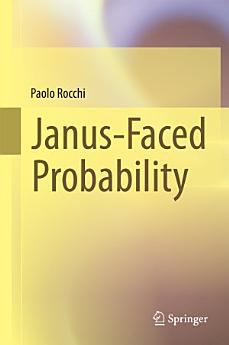Janus-Faced Probability
Paolo Rocchi
এপ্ৰিল ২০১৪ · Springer
ইবুক
147
পৃষ্ঠা
reportমূল্যাংকন আৰু পৰ্যালোচনা সত্যাপন কৰা হোৱা নাই অধিক জানক
এই ইবুকখনৰ বিষয়ে
The problem of probability interpretation was long overlooked before exploding in the 20th century, when the frequentist and subjectivist schools formalized two conflicting conceptions of probability. Beyond the radical followers of the two schools, a circle of pluralist thinkers tends to reconcile the opposing concepts. The author uses two theorems in order to prove that the various interpretations of probability do come into opposition and can be used in different contexts. The goal here is to clarify the multi fold nature of probability by means of a purely mathematical approach and to show how philosophical arguments can only serve to deepen actual intellectual contrasts. The book can be considered as one of the most important contributions in the analysis of probability interpretation in the last 10-15 years.
লিখকৰ বিষয়ে
Prof. Rocchi has already produced original proposals in various research fields such as computing, reliability theory, didactics and software programming and this book also suggests a creative solution.
এই ইবুকখনক মূল্যাংকন কৰক
আমাক আপোনাৰ মতামত জনাওক।
পঢ়াৰ নির্দেশাৱলী
স্মাৰ্টফ’ন আৰু টেবলেট
Android আৰু iPad/iPhoneৰ বাবে Google Play Books এপটো ইনষ্টল কৰক। ই স্বয়ংক্রিয়ভাৱে আপোনাৰ একাউণ্টৰ সৈতে ছিংক হয় আৰু আপুনি য'তে নাথাকক ত'তেই কোনো অডিঅ'বুক অনলাইন বা অফলাইনত শুনিবলৈ সুবিধা দিয়ে।
লেপটপ আৰু কম্পিউটাৰ
আপুনি কম্পিউটাৰৰ ৱেব ব্রাউজাৰ ব্যৱহাৰ কৰি Google Playত কিনা অডিঅ'বুকসমূহ শুনিব পাৰে।
ই-ৰীডাৰ আৰু অন্য ডিভাইচ
Kobo eReadersৰ দৰে ই-চিয়াঁহীৰ ডিভাইচসমূহত পঢ়িবলৈ, আপুনি এটা ফাইল ডাউনল’ড কৰি সেইটো আপোনাৰ ডিভাইচলৈ স্থানান্তৰণ কৰিব লাগিব। সমৰ্থিত ই-ৰিডাৰলৈ ফাইলটো কেনেকৈ স্থানান্তৰ কৰিব জানিবলৈ সহায় কেন্দ্ৰত থকা সবিশেষ নিৰ্দেশাৱলী চাওক।




